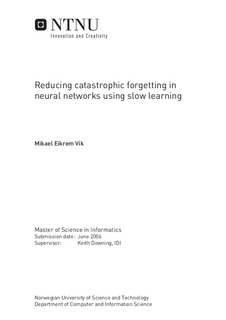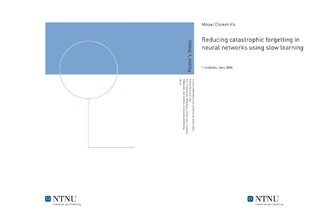| dc.contributor.advisor | Downing, Keith | nb_NO |
| dc.contributor.author | Vik, Mikael Eikrem | nb_NO |
| dc.date.accessioned | 2014-12-19T13:31:34Z | |
| dc.date.available | 2014-12-19T13:31:34Z | |
| dc.date.created | 2010-09-02 | nb_NO |
| dc.date.issued | 2006 | nb_NO |
| dc.identifier | 347406 | nb_NO |
| dc.identifier | ntnudaim:1526 | nb_NO |
| dc.identifier.uri | http://hdl.handle.net/11250/250408 | |
| dc.description.abstract | This thesis describes a connectionist approach to learning and long-term memory consolidation, inspired by empirical studies on the roles of the hippocampus and neocortex in the brain. The existence of complementary learning systems is due to demands posed on our cognitive system because of the nature of our experiences. It has been shown that dual-network architectures utilizing information transfer successfully can avoid the phenomenon of catastrophic forgetting involved in multiple sequence learning. The experiments involves a Reverberated Simple Recurrent Network which is trained on multiple sequences with the memory being reinforced by means of self-generated pseudopatterns. My focus will be on the implications of how differentiated learning speed affects the level of forgetting, without explicit training on the data used to form the existing memory. | nb_NO |
| dc.language | eng | nb_NO |
| dc.publisher | Institutt for datateknikk og informasjonsvitenskap | nb_NO |
| dc.subject | ntnudaim | no_NO |
| dc.subject | MIT informatikk | no_NO |
| dc.subject | Kunstig intelligens og læring | no_NO |
| dc.title | Reducing catastrophic forgetting in neural networks using slow learning | nb_NO |
| dc.type | Master thesis | nb_NO |
| dc.source.pagenumber | 70 | nb_NO |
| dc.contributor.department | Norges teknisk-naturvitenskapelige universitet, Fakultet for informasjonsteknologi, matematikk og elektroteknikk, Institutt for datateknikk og informasjonsvitenskap | nb_NO |

